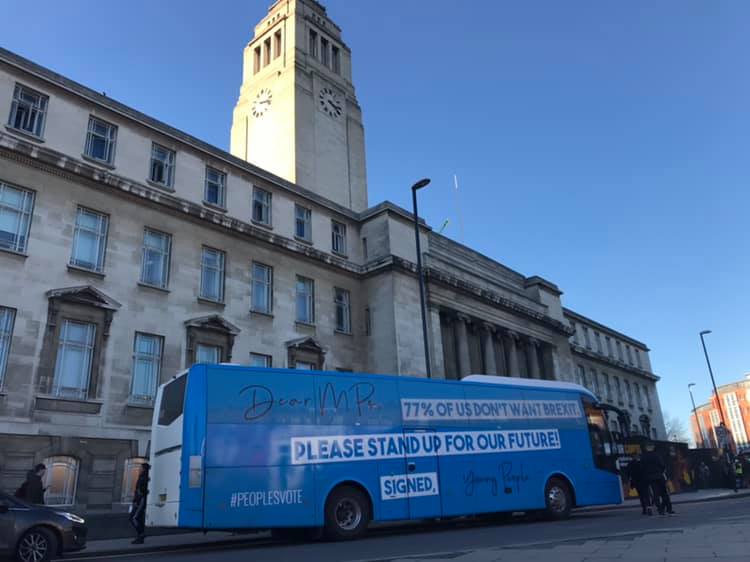The BATTLEBUS tour of the North may sound like a preview to the upcoming series of Game of Thrones, but it is merely another episode of the longest political satire ever:’Brexit’. Escaping the chaos at Westminster, the BATTLEBUS is the latest endeavor of OFOC, a grassroots organization campaigning for a final say on our fast-approaching European exit.
Beginning in Brussels with its first act of political defiance by driving over a copy of the withdrawal agreement, the mobile fortress traveled across Yorkshire earlier this week. Stopping in York, Bradford, Sheffield, Barnsley, Doncaster, Rotherham and Leeds, the Gryphon was afforded a special insight into the campaign.
“Brexit is a bad idea” he says, before launching into a well-versed critique of the current situation. Railing off damage to the NHS, the loss of control and the desire to preserve 40 years of integration, Femi Oluwole, co-founder and chief spokesperson for OFOC is intent on remaining in the EU.
Personal intentions aside – if that is even possible in the age of emotive politics – Mr.Oluwole has been at the forefront of calls for People’s Vote speaking on behalf of the younger generation that voted overwhelmingly to Remain. Generating a significant buzz nationwide, OFOC must be commended for their efforts, but ‘democracy’remains the unyielding thorn in the side of the People’s Vote. Deluded by the increasingly paradoxical desire to deliver on ‘the will of people’, Theresa May explicitly stated that a Peoples Vote would do “irreparable damage to the integrity of our politics”.
The North, particularly, has become a political pawn in this deceptive game but as Victoria Randal, a volunteer for the ‘People’s Vote, South West Yorkshire’ told me, many people have “changed their mind”. Put simply, democracy can change its mind. Lest not forget what David Davis said in 2012 “if democracy cannot change its mind, it ceases to be a democracy”. Though I’m sure this a statement Mr. Davis now regrets, it begs the critical question: has Brexit really led to a post-democratic political apocalypse?
The answer is no, of course not but British politics is in a remarkably strange place and the chance for democracy to change its mind has become deeply contentious. “The people cannot undermine their own will ”affirms Oluwole. He’s been answering this question for months. “If we had a referendum right now, there would be more time between the two previous referendums than between the two previous general elections”.
Interlaced with aggrandised claims, the debate about whether the proposed next step is democratic often overlooks a crucial point. Brexit could have meant “a thousand different things” in 2016. Put simply, the blind were leading the blind. Ridiculing the “terrible” failure to establish a clear trajectory for Brexit prior to the referendum, M.r Oluwole insists that this time would be different :“if we were to leave on a deal that been negotiated with 585 pages of detail, then there would be democratic legitimacy to us moving forward.”
But the question on everybody’s lips is the question: a two vote ballot; a three vote ballot; no-deal or her deal; her-deal or remain? The possibilities are baffling and it seems, no one really knows. Oluwole insists that this should be left for parliament to decide, but “logically” he says, “it should be between the deal that has been negotiated and remaining in the EU”.
Nevertheless, the campaign is resonating with its target audience. Second year politics student, Maire Gould-Yates insisted that a vote on “solid deal”would be “more democratic”, reflecting on the 2016 Leave campaign that was built on “lies”. However, the liberal university stereotype clouds the complexity of opinion. Joe Oakes, third year politics student and Communications Officer at 1828, condemned the people’s vote as a “farce”. That said, Joe is hardly the majority. Overwhelmed by the 78% of ‘young people’ that are reportedly against Brexit, OFOC provides a critical insight into the attitudes of the younger generation.
Though a word of caution: absolutely nothing is certain. There is a degree of naivety when Remainers discuss the likelihood of a vote to remain if a people’s vote were to occur. A proportion of Leave voters may have changed their mind, but the suggestion that the country has filtered out residual Leave tendencies amongst the political chaos is inaccurate. Driven by national identity and englishness grievances, there is no guarantee we wouldn’t remain in the same situation as we are now.
I admit, it is difficult to find positives in the possibility that a People’s Vote could produce the same result. But at least if – god forbid – we were to vote to leave again, it would be based on fact, not fiction. Genuine economic projections, not emotive buzzwords and pied piper inspired tunes, playing to the savior of the NHS. I am not entirely with Oluwole’s comprehensive loss of faith the ability of our “politicians to act in the national interest”. There are those that remain committed to deliver the will of their constituents. But he speaks only sense in the suggestion that no deal would be “electoral suicide”.
Though temporarily entertaining to listen to Jacob Reese Mogg spout bullshit about the opportunities that await an independent – or as I see it – isolated Britain, the no-deal bubble must be popped. Pre-Brexit fantasies about the return to british glory are truly nothing more than fantasy. The need for perspective is more pressing than ever. Femi Oluwole and Our Future, Our Choice provide this. It may be politically inconvenient but for sake of “their own interest”, if nothing else, the political establishment might do well to listen.
Lola Brittain
Image Credit: Our Future, Our Choice Campaign.

